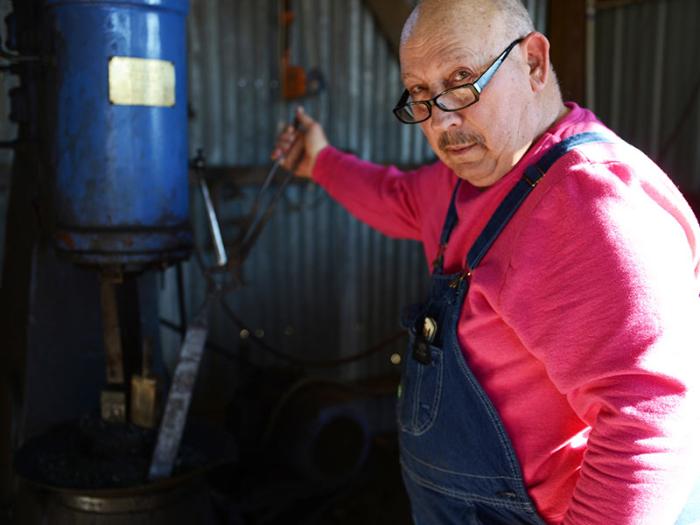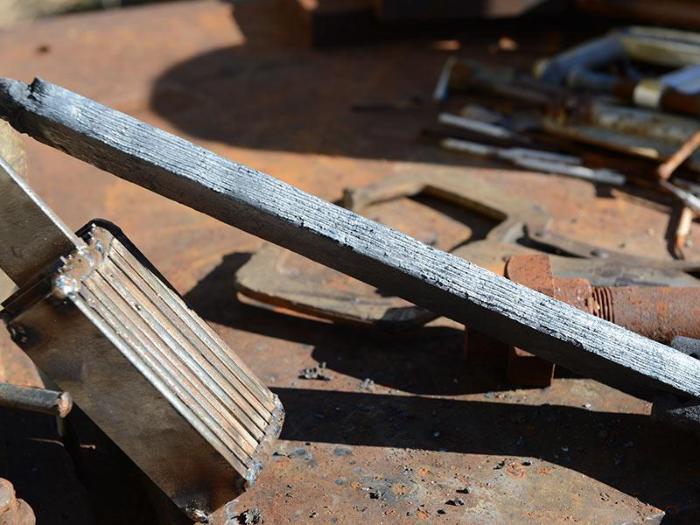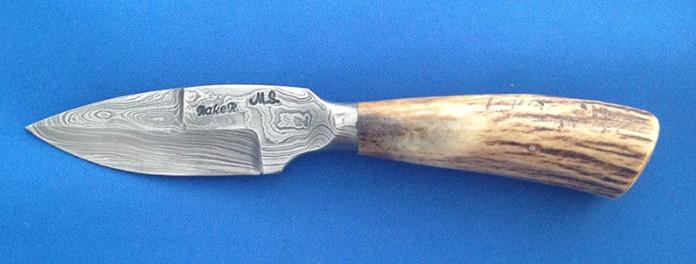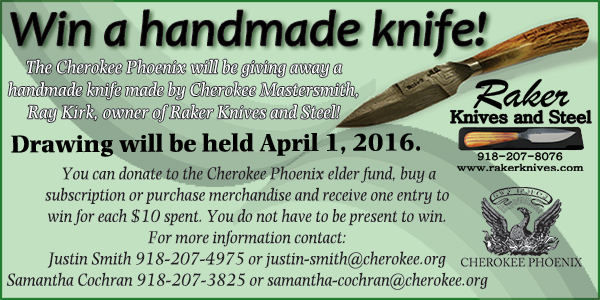 |
Canku Ota
|
 |
|
(Many Paths)
|
||
|
An Online Newsletter
Celebrating Native America
|
||
|
March 2016 - Volume
14 Number 3
|
||
|
|
||
|
Kirk’s Passion Stems
From Homemade Christmas Gifts
|
||
|
by Brittney Bennett
- Cherokee Phoenix Intern
|
||
KEYS, OK – When Cherokee Nation citizen Ray Kirk tried crafting knives as Christmas gifts for his family in 1989, he had no idea knife making would become his passion. “I first started forging knives because I wanted to make some Christmas presents and that seemed like the easiest, simplest thing to do,” he said. “Just make some knives. I was a welding instructor at a vo-tech at that time and we went to forging some, and one of my night class students gave me a book and some stuff on how to make knives. I liked it and I just kind of kept doing it.” More than 27 years later, Kirk owns Raker Knives and Steel and forges most knives from 52100 round bar steel, a far cry from his earlier knives forged from car springs. Though the material has changed, Kirk’s intent has not. “I love to make knives for working people,” he said. During the years, he’s honed his process, beginning with heating steel to a forging temperature in either his propane or natural gas forges.
“The propane forge has a blower on it, and that enables me to have a neutral atmosphere at low heat, and also at very high heat,” he said. “As long as you get the volume of gas and the volume of air mixture correct then you can get a pretty hot fire. I have a little blower on the front to keep it from blowing back on me when it’s running.” Once the steel is ready, he moves it to an air hammer for flattening. Once flattened, he works it using a homemade press and a hammer and anvil to shape it into a blade. He then grinds and sands it to smooth rough edges. After the blade is satisfactory, Kirk stamps his name into it and heat treats it so a handle can be added. He uses various handle materials, including Bois d’arc wood and antlers from sambar stag and elk. In addition to his business, Kirk travels knife shows and even appeared on the History Channel series “Forged in Fire,” in which he competed against other bladesmiths in New York City. He is also a member of knife-making associations, including the American Bladesmith Society. He said its purpose is to promote forging as an art and that he joined to further his skills. “They have documentation and a paper trail for your expertise,” he said. “In other words, you start off as an apprentice for two to three years and you pass a test. You become a journeyman for at least two years and then you pass a harder test and you become a master smith. I got my master smith in 2005. There’s only 115 in the world.” To put things into greater perspective, Kirk said he’s one of five master smiths from Oklahoma and the only Cherokee master smith. His tribal roots have also influenced his work, including the creation of a Trail of Tears knife. “The last time I was in Dahlonega, Georgia, is when I was picking up some 52100 round bar at the ball bearing factory there,” he said. “One of the guys said, ‘One of the Trail of Tears started here.’ I thought, yeah I knew that, but I never put it together. And then on the way home I decided to make a knife that would be representative of the Trail of Tears.” The blade and handle form of a teardrop, and Kirk stamped it with teardrops that fall from the knife’s point. “The story of a knife sometimes is important or more important than its abilities to perform its duties as a cutting tool,” he said.
The bar from Dahlonega is also in a Damascus knife Kirk made for a Cherokee Phoenix giveaway. Entries can be obtained by donating to the Cherokee Phoenix elder fund or buying a subscription or merchandise. One entry is given for every $10 spent. A winner will be announced April 1. For more information, call Samantha Cochran at 918-207-3825 or Justin Smith at 918-207-4975 or email samantha-cochran@cherokee.org or justin-smith@cherokee.org. For more information on Raker Knives and Steel, visit, www.rakerknives.com, email: ray@rakerknives.com or call 918-207-8076.
|
|||||||
|
|
|
|
||
|
|
||
| Canku Ota is a free Newsletter celebrating Native America, its traditions and accomplishments . We do not provide subscriber or visitor names to anyone. Some articles presented in Canku Ota may contain copyright material. We have received appropriate permissions for republishing any articles. Material appearing here is distributed without profit or monetary gain to those who have expressed an interest. This is in accordance with Title 17 U.S.C. Section 107. | ||
|
Canku Ota is a copyright ©
2000 - 2016 of Vicki Williams Barry and Paul Barry.
|
||
 |
 |
|
|
The "Canku
Ota - A Newsletter Celebrating Native America" web site and
its design is the
|
||
|
Copyright ©
1999 - 2016 of Paul C. Barry.
|
||
|
All Rights Reserved.
|
||



